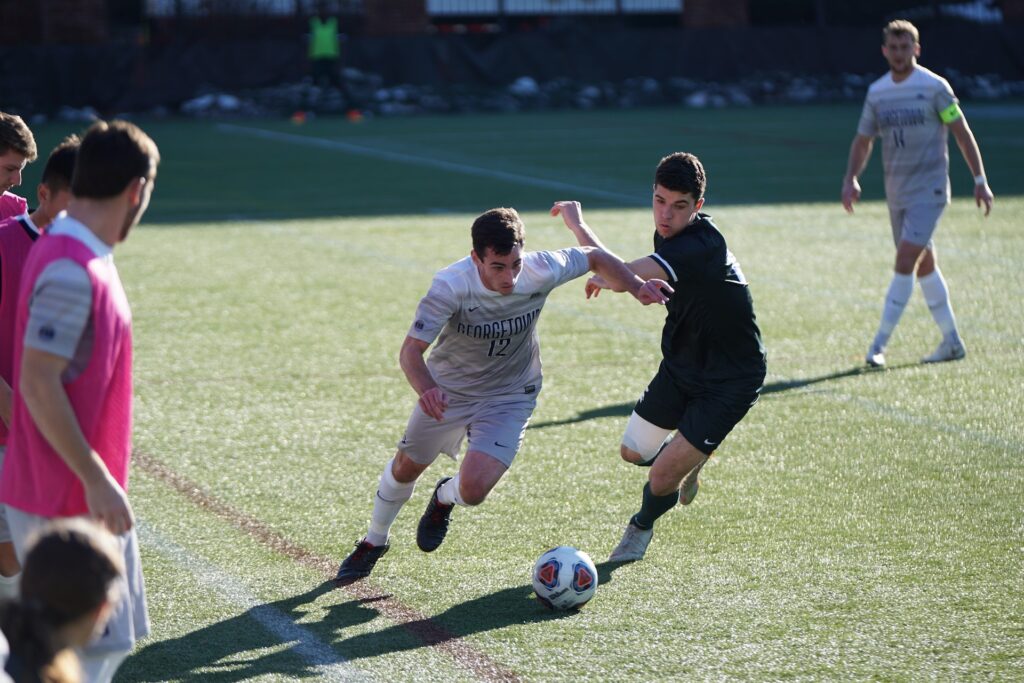There has long been a problem in soccer – once a game of significant physical challenges – of players exaggerating contact and essentially cheating out on the field.
This is known as a simulation in soccer, and it’s a huge problem in the game today.
In this article, we take a closer look at what simulation in soccer is, why it’s a problem, and how VAR is having a positive impact on gamesmanship in the game.
So, what is simulation in soccer?
Simulation in soccer is the act of trying to con the referee into awarding a free kick by diving or feigning injury. Simulation is all too common in soccer, as players look to gain an onfield advantage by any means necessary.
Under the laws of the game, simulation is punished by an indirect free kick and a caution to the offending player. It was hoped that the threat of a caution would stamp simulation out of the game, but it’s still a big problem in soccer today.
Read on to find out everything you need to know about simulation in soccer and why it remains a big problem today, even in the age of VAR.
Why is simulation in soccer a problem?
Simulation is a problem in soccer because it’s a form of cheating. When you feign injury or try and con the referee into awarding you a free kick without cause, it’s an act of deceit that can sometimes work in your favor.
Players who dive and pretend to be injured cause match officials serious problems, and it can have a huge impact on the outcome of a game, particularly in grassroots soccer.
As a referee, I can tell you that it’s often really difficult to tell if a player has dived or tried to con you, as you only get one look at the incident. A player can successfully ride a challenge and then hit the floor without contact, prompting you, as the referee, to award a penalty.
In the grassroots game, when you’re in charge of an amateur or kids’ soccer game, there’s no VAR and often no assistant referees to help you arrive at the correct decision. As a result, you have no choice but to stick by your decision, even if you think that you might have been conned.
There’s also a slightly more cynical reason why simulation in soccer is such a problem. When a referee becomes sick and tired of soccer players diving and trying to cheat, they’re less inclined to stop the game when a genuine injury occurs.
It’s a little bit like the fable of the boy who cried wolf. If players on one team consistently simulate and try and con the referee when a foul is actually committed against one of their players, the referee is less likely to award a foul.
While lots of soccer players assume that referees judge every single decision on its own merit, let me tell you from experience that individuals that cheat and try to simulate fouls are much less likely to be given fouls in the remainder of the game – so bear this in mind before you think about trying to cheat the referee!
Why do soccer players simulate fouls?

The main reason why soccer players simulate fouls is to gain an advantage over their opponents. For instance, if a player makes it into the penalty area and senses a challenge from an opponent, they can pretend that contact has been made and fall to the floor in the hope that the referee will award a penalty kick.
While referees can often spot simulation, it’s not always possible, and it largely depends on their view of the incident. Players – particularly in grassroots soccer – know that they have a good chance of conning the referee, so they think that it’s worth a chance, particularly if it can yield a penalty.
Other times, players simulate fouls in order to try and get their opponents into trouble. For instance, if a player has already been cautioned by the referee, that player might be targeted by opponents in an attempt to get them sent off by way of a second caution. An effective way to do this would be to simulate a foul.
Are you wondering why on earth soccer players act in this way? Check out our recent article, where we take a closer look at why soccer players are so dramatic!
While VAR certainly isn’t universally popular in soccer, it does have one distinct advantage – it has significantly reduced the number of incidences of simulation in professional soccer, as we explain below.
The impact of VAR on simulation in soccer
In the professional game, VAR has had a hugely positive impact on incidences of simulation. After all, even if your onfield simulation cons the referee at first, the Video Assistant Referee (VAR) will review the incident and advise the referee accordingly.
Since VAR was introduced in the Premier League, there’s anecdotal evidence to show that incidences of simulation – particularly in the eighteen-yard box – have significantly reduced. This is primarily because players know that their deception won’t gain them an advantage and is only likely to get them into trouble.
But as mentioned, VAR is only available in the top leagues in the world, and the problems associated with simulation in grassroots soccer continue. I can’t tell you how many times players try to simulate fouls in order to win ill-gotten free-kicks in amateur soccer – it’s extremely frustrating and needs to be stamped out.
Is simulation the same as diving in soccer?
While the rule is known as a simulation in soccer, there are several ways to refer to the practice of deceiving a referee. Some people call it diving, but this isn’t always accurate, as you can con the referee without falling to the floor.
Simulation is sometimes also known as gamesmanship, which seems like a more polite way to say that someone is trying to blatantly cheat for an advantage!
Whatever you call it or know it as, simulation in soccer is a big problem, and even though VAR has made important strides forward in the professional game, diving and cheating still persist in grassroots soccer, which is where many of us enjoy the beautiful game.
Recap: Simulation in soccer
While there’s a lot to love about the beautiful game, simulation isn’t one of them. In fact, simulation is one of the biggest issues with grassroots soccer, and it makes the job of referees even more difficult than it already is.
So, if you’re a player, don’t be tempted to cheat the system by simulating a foul. Stay on your feet and get on with the game, as it’s much better to win a soccer match with your integrity intact, than to secure a win by cheating your opponents.

